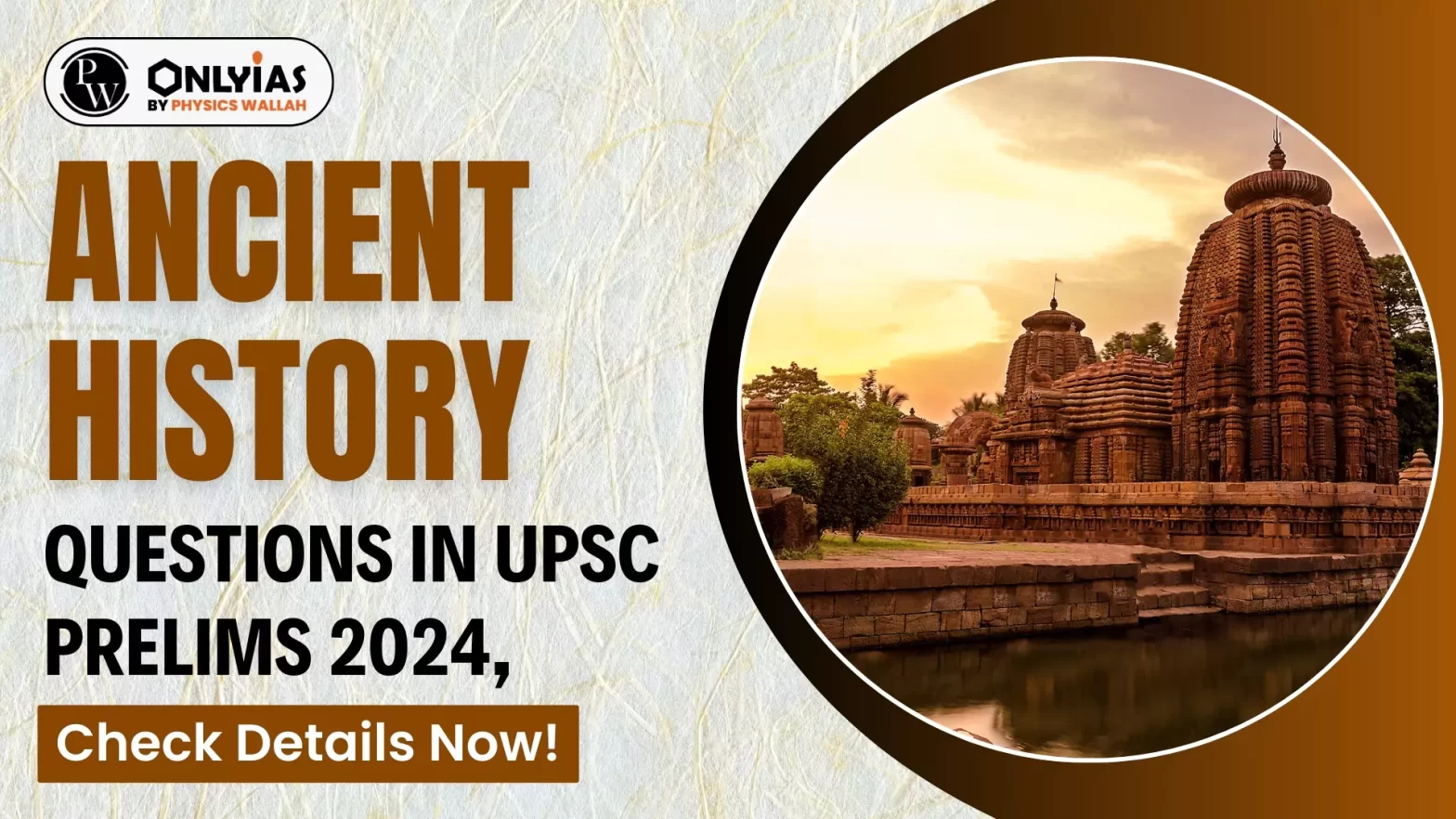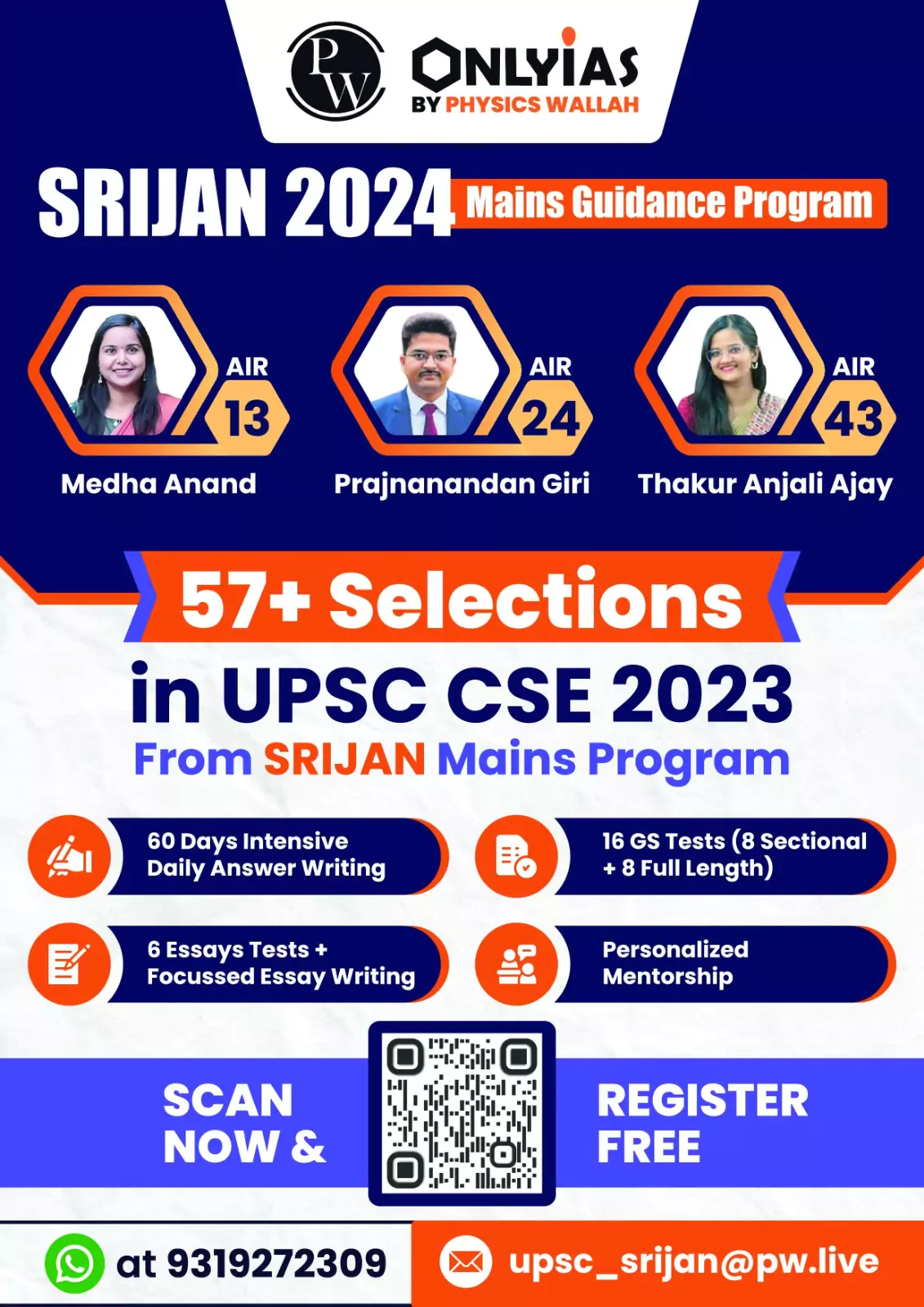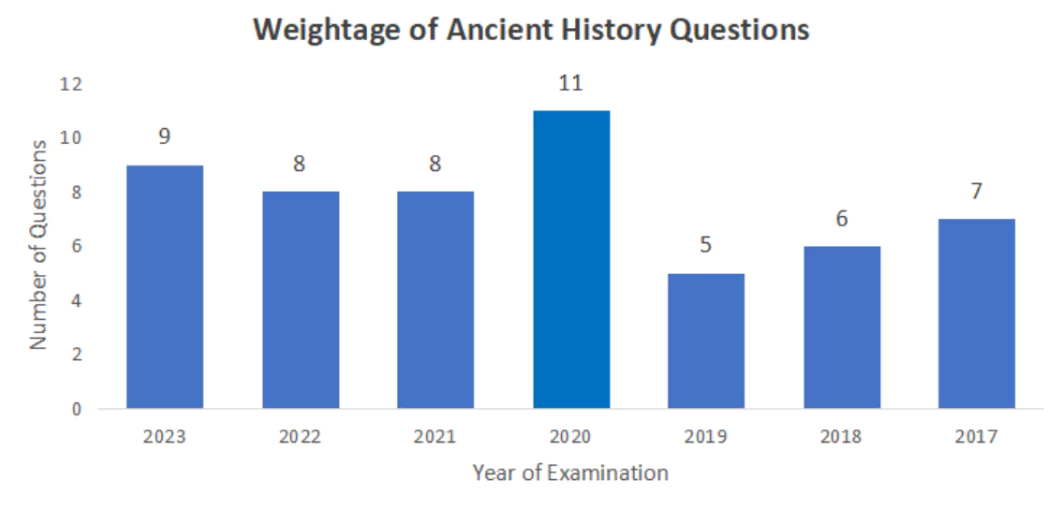Prepare effectively for the Ancient History section in UPSC Prelims 2024 with insights into question trends, important themes, and key topics. Explore sample questions, detailed answers, and strategies for success. Enhance your preparation with expert guidance and resources!

Ancient history questions in UPSC prelims have witnessed an upward trend in the past few years. In the last few years, the number of questions asked from this section has gone up, making it a vital part of a candidate’s preparation.
| Download UPSC Prelims Question Paper 2024 | |
| UPSC Prelims GS Paper I | Download Link |
| UPSC Prelims GS Paper II CSAT | Question Paper Download Link |
| Answer Key 2024 | GS Paper (01) Answer Key 2024 CSAT Paper Answer Key 2024 |
| DetaIled Answer Key 2024 | GS Paper (01) Answer Key 2024 CSAT Paper Answer Key 2024 |
The difficulty level of ancient history questions in UPSC prelims has also gone up as UPSC has been focusing more on ignored themes such as authors, ports, locations associated with religious sects etc. While going through, you will come across certain themes that UPSC has been giving special focus. Candidates who have been unable to decide what topics to study for ancient history will get an idea by the end of this article on ancient history questions in UPSC prelims.
Let us have a look at the Ancient History Questions in UPSC Prelims 2024, along with the trends of the themes from the Previous years questions. The Trend Analysis of the previous years Ancient History Questions in UPSC Prelims is also given here.
The table below contains the Ancient History Questions in UPSC Prelims 2024 with Answers:
| Ancient History Questions in UPSC Prelims 2024 with Answers | ||||||||||||||||||||||
| Serial No | Question | Answer | ||||||||||||||||||||
| 1. | Which one of the following is a work attributed to playwright Bhasa?
(a) Kavyalankara (b) Natyashastra (c) Madhyama-vyayoga (d) Mahabhashya |
(c) Madhyama-vyayoga | ||||||||||||||||||||
| 2. | Sanghabhuti, an Indian Buddhist monk, who travelled to China at the end of the fourth century AD, was the author of a commentary on :
(a) Prajnaparamita Sutra (b) Visuddhimagga (c) Sarvastivada Vinaya (d) Lalitavistara |
(c) Sarvastivada Vinaya | ||||||||||||||||||||
| 3. | With reference to ancient India, Gautama Buddha was generally known by which of the following epithets?
Select the correct answer using the code given b (a) 1 only (b) 2 and 3 only (c) 1, 2 and 3 (d) None of the above are epithets of Gautama Buddha |
(b) 2 and 3 only | ||||||||||||||||||||
| 4. | Consider the following information:
In which of the above rows is the given information correctly matched? (a) 1 and 2 (b) 2 and 3 (c) 3 and 4 (d) 1 and 4 |
(b) 2 and 3 | ||||||||||||||||||||
| 5. | Consider the following statements:
Which of the statements given above is/are correct? (a) 1 only (b) 2 only (c) Both 1 and 2 (d) Neither 1 nor 2 |
(b) 2 only | ||||||||||||||||||||
Ancient History Questions in UPSC Prelims 2024 can be anticipated a little by seeing the Ancient History Questions of UPSC Prelims 2023 and other previous years. UPSC followed the same trend as in 2022 by asking 9 ancient history questions in UPSC prelims. Below are the questions asked from ancient history in UPSC prelims 2023.
1) In which one of the following regions was Dhanyakataka, which flourished as a prominent Buddhist centre under the Mahasanghikas, located?
(a) Andhra
(b) Gandhara
(c) Kalinga
(d) Magadha
Answer: (a)
2) With reference to ancient South India, Korkai, Poompuhar, and Muchiri were well known as
(a) capital cities
(b) ports
(c) centres of iron-and-steel making
(d) shrines of Jain Tirthankaras
Answer: (b)
3) With reference to ancient India, consider the following statements:
How many of the statements given above are correct?
(a) Only one
(b) Only two
(c) All three
(d) None
Answer: (b)
4) Consider the following dynasties:
How many of the above dynasties established their kingdoms in the early eighth century AD?
(a) Only one
(b) Only two
(c) Only three
(d) None
Answer: (d)
5) Which one of the following explains the practice of Vattakirutal’ as mentioned in Sangam poems?
(a) Kings employing women bodyguards.
(b) Learned persons assembling in royal courts to discuss religious and philosophical matters
(c) Young girls keeping watch over agricultural fields and driving away birds and animals
(d) A king defeated in a battle committing ritual suicide by starving himself to death
Answer: (d)
6) “Souls are not only the property of animal and plant life, but also of rocks, running water, and many other natural objects not looked on as living by other religious sects.”
The above statement reflects one of the core beliefs of which one of the following religious sects of ancient India?
(a) Buddhism
(b) Jainism
(c) Shaivism
(d) Vaishnavism
Answer: (b)
7) With reference to ancient Indian History, consider the following pairs:
| Literary Work | Author |
| Devichandraguptam | Bilhana |
| Hammira-Mahakavya | Nayachandra Suri |
| Milinda-panha | Nagarjuna |
| Nitivakyamrita | Somadeva Suri |
How many of the above pairs are correctly matched?
(a) Only one
(b) Only two
(c) Only three
(d) All four
Answer: (c)
8) Consider the following pairs:
| Site | Well known for |
| Besnagar | Shaivite cave shrine |
| Bhaja | Buddhist cave shrine |
| Sittanavasal | Jain cave shrine |
How many of the above pairs are correctly matched?
(a) Only one
(b) Only two
(c) All three
(d) None
Answer: (b)

The trend of Ancient History Questions in UPSC Prelims 2024 can be understood by analysing the Ancient History Questions in UPSC Prelims from previous years. Examiners have been giving significant weightage to ancient history questions in UPSC prelims. This is the reason why candidates have to put efforts into covering the topics under ancient history. The following table contains the number of questions asked in ancient history in the last few years.
| Year | Number of Ancient History Questions |
| 2023 | 8 |
| 2022 | 8 |
| 2021 | 8 |
| 2020 | 11 |
| 2019 | 5 |
| 2018 | 6 |
| 2017 | 7 |

Every candidate needs to understand the Ancient History Questions in UPSC Prelims in the previous years to prepare the Ancient History Questions in UPSC Prelims 2024. Ancient history is a tricky subject which needs a slight tweak in approach to succeed. Candidates can follow some of the strategies mentioned below to score more marks in the subject.
There are certain themes under ancient history that UPSC wants candidates to focus on. This is the reason why questions are regularly asked from these themes. The following table contains important themes for ancient history questions in UPSC prelims.
| Themes | Significance |
| Indus Valley Civilization | 1-2 questions related to location, features etc. |
| Sangam Period | 1-2 questions related to literature, society, kingdoms etc. |
| Jainism and Buddhism | 2-3 questions |
| Mauryan Period | 0-1 question related to society, economy etc |
| Asokan Inscriptions | 0-1 question |
| Gupta Period | 2-3 questions related to literature, personalities, society etc |
| Post-Gupta Period | 0-1 question related to dynasties and their contribution. |
Candidates can check sample ancient history questions in UPSC prelims from important topics given below.
Indus Valley Civilization
Q. Which one of the following ancient towns is well-known for its elaborate system of water harvesting and management by building a series of dams and channeling water into connected reservoirs? (2021)
(a) Dholavira
(b) Kalibangan
(c) Rakhigarhi
(d) Ropar
Sangam Period
Q. Which one of the following statements about Sangam literature in ancient South India is correct? (2022)
(a) Sangam poems are devoid of any reference to material culture.
(b) The social classification of Varna was known to Sangam poets.
(c) Sangam poems have no reference to warrior ethics.
(d) Sangam literature refers to magical forces as irrational.
Buddhism and Jainism
Q. With reference to the religious practices in India, the “Sthanakvasi” sect belongs to (2018)
(a) Buddhism
(b) Jainism
(c) Vaishnavism
(d) Shaivism
Asokan Inscriptions
Q. In which of the following relief sculpture inscriptions is ‘Ranyo Ashoka’ (King Ashoka) mentioned along with the stone portrait of Ashoka? (2019)
(a) Kanganahalli
(b) Sanchi
(c) Shahbazagrhi
(d) Sohgaura
Post-Mauryan India
Q. From the decline of Guptas until the rise of Harshavardhana in the early seventh century, which of the following kingdoms were holding power in Northern India? (2021)
Select the correct answer using the code given below.
(a) 1, 2 and 5 only
(b) 1, 3, 4 and 6 only
(c) 2, 3, and 4 only
(d) 5 and 6 only
Gupta Period
Q. With reference to forced labour (Vishti) in India during the Gupta period, which one of the following statements is correct? (2019)
(a) It was considered a source of income for the State, a sort of tax paid by the people.
(b) It was totally absent in the Madhya Pradesh and Kathiawar regions of the Gupta Empire.
(c) The forced labourer was entitled to weekly wages.
(d) The eldest son of the labourer was sent as the forced labourer.
Enhance your UPSC preparation by joining the top courses from Physics Wallah! Enroll now!
UPSC asks a mix of questions from ancient history which range from moderate to difficult.
Yes. Many questions asked from ancient history can be solved by reading NCERT books. Most of the Ancient History Questions in UPSC Prelims are based on the facts and data from the NCERT books.
No. UPSC does not repeat the questions. However, the themes and options can be repeated in the exam. Candidates need to analyse the Ancient History Questions in UPSC Prelims to understand the complete pattern.
On an average, UPSC asks about 10-15 questions from ancient history topics in UPSC prelims.
Candidates can remember facts by reading the topic multiple times. Apart from that, regular revision holds the key to recalling the information.

<div class="new-fform">
</div>